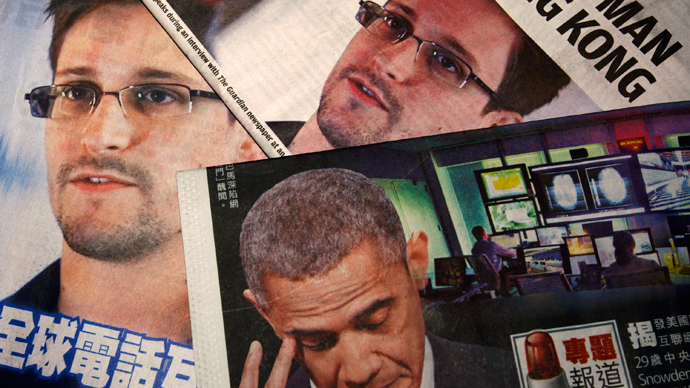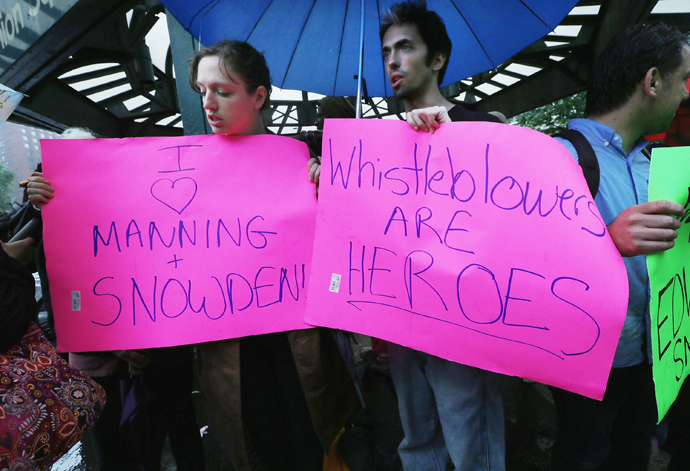‘People who didn’t know extent of this kind of spying now woke up’

Millions of people believe Edward Snowden did the right thing in exposing the US government’s mass data collection, and it will embolden them to stand up for freedoms that are slowly slipping out of their clutches.
Josh Levy, internet campaign director at Free Press, spoke to RT
about the actions that could result from any subsequent public
pressure.
RT:The US Government has opened up a criminal
investigation – how far will they go do you think? Is Snowden
going to end up like WikiLeaks or Bradley Manning?
Josh Levy: I can’t really speculate on what his fate is – I
think that lies instead with the US government. I think that
there’s a lot of support for Snowden and there’s a lot of public
support in the way that there never really was for Bradley
Manning, and I think that’s in part because people are seeing
more moral authority in the case of Snowden – they’re seeing that
he really did do the right thing as far as he’s concerned and
many millions of others are concerned, and he didn’t put any
lives in danger. So people are being very careful to
differentiate him, and I think for that reason, and because of
all that public support I think it’s going to be harder for the
US government to press forward with the case in silence.
RT:The extent of the program has drawn anger from
European officials - will it hurt security ops on both sides of
the Atlantic?
JL: It’s hard for me to comment on that too. My concern is
not actually whether it will hurt cooperation between large
governments talking back and forth. But what it means for the
broader movement to protect their freedoms and their online
rights –and I actually think that Snowden’s work in releasing all
of this information has been a boon to people who have been
working for years to try to get the word out about government
surveillance programs and the harms that they present to regular
everyday people who are trying to use the internet for
communications and to actually engage in democracy and political
action.

RT:Your experience dealing with internet freedom
issues -will his revelations embolden other countries to act in a
similar way?
JL: It’s possible - I suppose we’ll have to wait and see.
I think, again, it may embolden governments to act in certain
ways but it will embolden regular internet users to stand up for
their rights and to actually be more protective of things they
realize are slipping away from them every day.
RT:Now Edward Snowden says that he exposed the program
in the hope that by informing the public he would close it down.
But will it be successful? How likely is this?
JL: Well, I think it’s more likely today than it was last
week – that’s for sure. A) Because we know the program exists and
B) because of all of the momentum that this has given to
movements that have been around for a long time – I think a lot
of people who didn’t know the extent of this kind of spying have
now woken up to it and are outraged – they’re shocked that their
own governments are engaging in these practices that reminds a
lot of us of the Cold War and things that were going on in places
like East Germany during that time, and I don’t think any of us
want to see that happen now, so I think that yes. It’s more
likely that these will get shut down, or at least certain laws
that allow these widespread surveillance programs to exist will
be reformed to protect people’s privacy.
RT:But the president and his chief of intelligence
defend the surveillance, saying that it helps protect the
country. Does it enhance security?
JL: I’m not a security analyst so I can’t really answer
that question – all I can say is that it makes a lot of sense
that the president and others in his administration would defend
the program – it’s a program that they’ve been overseeing that
inherited from the Bush administration – they obviously believe
in it because they’ve been executing it all these years – it
doesn’t mean it’s right, and it doesn’t mean that it can’t end,
and it doesn’t mean the president is immune from public pressure.
So I think that we’re going to see a lot of public pressure
starting up in the days to come – tomorrow I think you’re going
to see a lot of pressure coming from the grass roots
specifically, and he’s going to be forced to respond to it
somewhere.
The statements, views and opinions expressed in this column are solely those of the author and do not necessarily represent those of RT.












